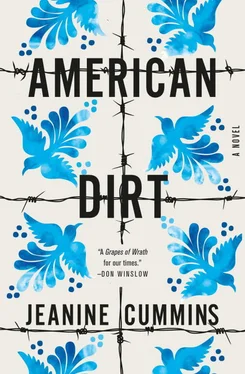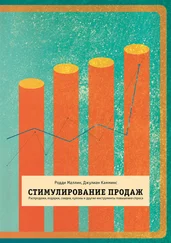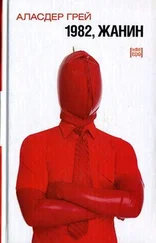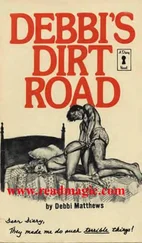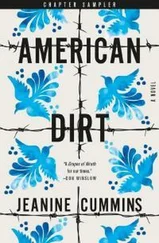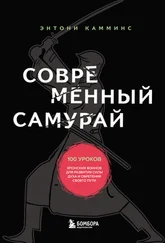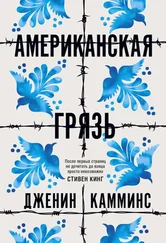‘It’s empty.’ He shrugs, replacing the inhaler in his pocket. ‘But the memory of the medicine helps.’
Luca smiles, but Lydia furrows her brow.
‘Will you be okay?’ she asks. Despite her instinctive suspicion, she’s still a mother, and you can’t fake a wheeze like that.
The boy coughs again, once, twice, and then spits something solid over the edge of the train car. ‘It will pass in a minute,’ he wheezes.
They watch him for signs of a medical emergency, though it’s unclear how they could help if the episode does not, in fact, pass. He sits up straight, looks out across the landscape, folds his legs into the shape of a pretzel, and concentrates on breathing slowly. As he does this, Lydia’s relieved to see the existence of a hole in the sole of his sneaker. No boy with an empty inhaler and a hole in his sneaker could belong to a gang or cartel.
After he manages to regain a steady breath, the boy turns to Luca and says, ‘I’m Beto. What’s your name?’
‘Hello, Beto. I’m Luca.’
Beto nods. Their train is passing a village that seems to have grown right out of the tracks – just a cluster of houses the same rusty color as the land, and two competing taquerías that face off across the lone street.
‘Is your breathing better now?’ Luca asks.
‘Yeah, it’s fine,’ Beto says. ‘Happens whenever I run too fast, but you learn how to be calm until it passes, because if you freak out, that makes it worse.’
Luca nods.
‘It’s cool to meet another kid,’ Beto announces then. ‘I don’t see that many kids out here. How old are you?’
‘Eight.’
‘I’m ten. Almost eleven, though.’ He says this like a very wise old man.
Luca has about a thousand questions for Beto, but the effect of having them all packed so tightly together in his brain is that none of them shakes loose and gets through the gate. Lydia leans into the opening left by Luca’s silence.
‘Beto, are you traveling alone?’ Luca can tell that his mami is trying not to sound judgmental, but the effort isn’t entirely successful. Beto doesn’t seem to care, or even to notice.
‘Yep, just me.’ He grins, displaying the absence of two teeth on the bottom, a canine and a molar side by side, so the hole is a double-wide. Beto sticks his tongue through it.
Now it’s Soledad’s turn. ‘Were you traveling south?’ she asks.
‘I was. Temporarily. But now I’m traveling north,’ he says without irony.
Soledad doesn’t know quite how to respond, but Beto saves her the trouble by changing the subject.
‘ Guau, you’re really pretty,’ he says.
Soledad blinks but doesn’t respond.
‘Must be a pain in the ass, huh?’
She laughs.
He returns his attention to Luca. ‘So where you guys from?’
Luca glances at Mami, who responds with only the tiniest shake of her head. ‘Mami and I are from… Puebla,’ he decides. ‘And the sisters are Ecuadorian.’
Beto nods. The lie doesn’t matter at all; those places may as well be Antarctica or Mars as far as he’s concerned.
‘How about you?’ Luca asks. ‘Where are you from?’
‘I’m from Tijuana,’ Beto says. ‘But we call it TJ. I was born there, in the dompe .’
An utterly bizarre piece of information. So odd, in fact, that Luca’s not sure he understands. Again, this is an unfamiliar word, dompe . Luca looks at Mami to translate, but she seems confused as well.
‘What’s a dompe ?’ Luca asks.
Beto smirks. ‘You know, a dompe, where people dump their garbage. The trucks come. You know, a dompe .’
‘You mean like a vertedero ?’ Luca asks, using the Spanish word for ‘dump’.
‘Yeah, yeah, a vertedero, ’ Beto says.
Lydia, because her English is slightly more sophisticated than Luca’s, begins to understand that this boy’s native language is not exactly the Spanish of Mexico, nor is it the English of the United States, but rather some kind of semantic borderland crossbreed. Still, this insight does nothing to clarify what the boy means when he says he was born in a dompe . Luca literally scratches his head – a gesture Lydia hasn’t seen him make, she now realizes, since the decimation of their family. It’s a gesture that in fact she never noticed before, and therefore she didn’t miss when it vanished, but now that she sees it again, she’s floored by an accompanying revelation that the gesture, one thumb on top of his ear, three fingers raking through his hair above, is specific to Luca’s intellectual curiosity. It’s a tic that happens only when he’s intrigued by something, when he finds something interesting. The reappearance of it, therefore, feels to Lydia like evidence that her son might survive, that he might be capable, after fifteen days and fourteen hundred miles, of temporarily losing himself in a moment of uncorrupted curiosity. The feeling that thuds through her sternum is hope .
‘So you were born in a garbage dump?’ Luca asks carefully, trying not to be rude, and not understanding that there’s nothing at all discourteous about the question, because Beto is neither ashamed of the facts of his origin nor, for that matter, even aware that the facts of his origin might, in other people, incite feelings of discomfort. His origin is simply his origin, and he tells the story without any kind of appreciation of the effect it might provoke.
He laughs. ‘Yeah, well, I wasn’t born in the garbage, though. Just near it. In Colonia Fausto González. You heard of it?’
Luca shakes his head.
‘It’s kinda famous,’ Beto says proudly.
Lydia knows a little about las colonias of Tijuana because she’s read the books, because Luis Alberto Urrea is one of her favorite writers, and he’s written about the dumps, about kids like Beto who live there. That flare of recognition makes her feel like she knows him already, at least slightly, but that feeling is half-hollow, a shadow puppet. Because though she may understand something of this boy’s circumstances, she doesn’t know him . Still, the familiarity has the effect of thawing the part of her that would otherwise remain hardened to him.
And then Beto tells them his whole life story, all of it without stopping, without even really taking a breath, how he doesn’t remember his father, who went to el norte when Beto was still a baby. But he remembers his mami, who was a garbage picker in el dompe before they closed it. And he remembers his big brother, Ignacio, who’s still there in el dompe, buried beneath a sky-blue, hand-painted cross with his name, Ignacio, and the words mijo, 10 años.
Beto reminds Luca that he’s ten years old, and explains that that’s the same age his brother, Ignacio, was when he was squashed by the back tire of a garbage truck while reaching for the miraculous, round, unblemished sphere of a balón de fútbol he’d spotted amid the refuse. An unprecedented treasure. Beto, who was eight years old and standing nearby at the time, was so stunned by Ignacio’s screams that he failed to secure the balón for his dying brother. (Instead, a pimple-faced kid named Omar got it.) Because of the softness of the ground beneath the truck’s tires, Beto explains, Ignacio was not entirely flattened, but rather compressed into the garbage beneath him – crushed just enough that he survived for three dreadful days. It wasn’t long after that, and the sky-blue cross, that Beto’s mami disappeared, too, first into a drunken stupor, next into a new, more rancid haze, and finally, into the ether.
Beto is afraid of turning eleven, because it feels like a treachery to his brother. ‘But I guess it would be worse to not turn eleven, right?’ He laughs, and Lydia and the sisters attempt to join him in that sound.
Читать дальше
